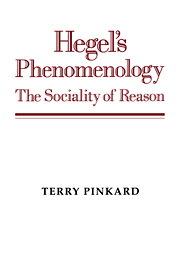Book contents
- Frontmatter
- Contents
- Acknowledgments
- Hegel's Phenomenology
- 1 Why the Phenomenology of Spirit?
- 2 The claims to self-sufficient knowledge: sense-certainty, perception, understanding
- 3 The claims of self-sufficient agency: freedom and self-consciousness
- 4 Modern life's project of self-justification
- 5 Modern life's alternatives and modern life's possibilities
- 6 The self-reflection of the human community
- 7 The essential structure of modern life
- Notes
- Works cited
- Index
1 - Why the Phenomenology of Spirit?
Published online by Cambridge University Press: 05 September 2014
- Frontmatter
- Contents
- Acknowledgments
- Hegel's Phenomenology
- 1 Why the Phenomenology of Spirit?
- 2 The claims to self-sufficient knowledge: sense-certainty, perception, understanding
- 3 The claims of self-sufficient agency: freedom and self-consciousness
- 4 Modern life's project of self-justification
- 5 Modern life's alternatives and modern life's possibilities
- 6 The self-reflection of the human community
- 7 The essential structure of modern life
- Notes
- Works cited
- Index
Summary
The problem of the Phenomenology
The 1807 Phenomenology of Spirit is one of Hegel's most read, best known and least understood works. It has an air of mystery about it: at once profound yet obscure, detailed, important but only available to the initiated. It is written in an unmistakable style that identifies it as “Hegelian” both to its admirers and detractors. Even the tales of its creation have a bit of romance to them, with one story having Hegel supposedly writing the final parts on the night that the city in which he is living, Jena, is being shelled by Napoleon's troops in one of the climactic battles of the old regime in Europe. In one of the most celebrated interpretations of the Phenomenology, the Russian emigre to France, Alexandre Kojève, interpreted the book as giving philosophical voice to the “end of history” that was being given political voice by Napoleon's soldiers. Hegel himself was in dire straits at the time, having only recently entered academic life and having a job that seemed to be without a future. Had Hegel been hit by the proverbial horse cart at this point in his life, he would have been remembered (if at all) as one of the very minor figures in German idealism, a commentator on Schelling and Fichte.
- Type
- Chapter
- Information
- Hegel's PhenomenologyThe Sociality of Reason, pp. 1 - 19Publisher: Cambridge University PressPrint publication year: 1994
- 1
- Cited by



